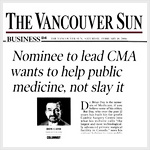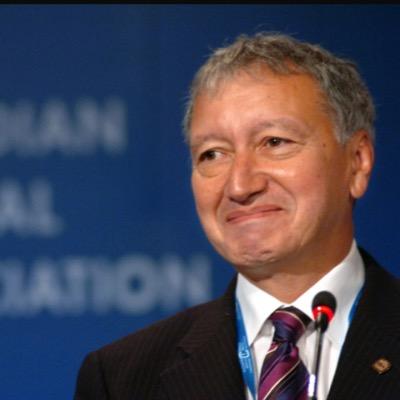
Nominee to lead CMA wants to help public medicine, not slay it
Feb 18, 2006
The Vancouver Sun
By Don Cayo
Dr. Brian Day is the nemesis of Medicare, if you believe some of his critics.
But Day, who over the past 12 years has built his for-profit Cambie Surgery Centre into what his website calls "the largest and most technologically advanced private surgical facility in Canada," sees his actions helping to save public medicine, not slay it.
No, he hasn't had an epiphany on the road to Charlottetown where, if usual practice prevails this summer, he'll be elected president of the Canadian Medical Association, the powerful lobby group that represents the country's doctors.
Just this week he pulled off a stunning upset to win the B.C. nomination for the post, which, by convention, is supposed to be filled by the B.C. nominee this year. And that win came about because of his strong views on a role for private medicine in the system, not in spite of it.
So, if he's not changing his mind, how is this committed privatizer helping to save Canada's public health-care system?
The answer is through competition -- a simple remedy that any business person could prescribe and that, judging from Day's unexpected endorsement from B.C. doctors, is beginning to dawn on his colleagues as well.
The mainstay of Day's substantial business is to provide timely surgery for patients who pay their own freight -- or who have it paid for them by someone like WorkSafeBC, the RCMP, the military, ICBC, or the federal departments of Indian or veterans' affairs.
But Day's hospital also does work on contract for the public system. And that, he says, seems to be teaching that big, unwieldy public institution a lesson it sorely needs to learn.
"A few years ago," he said, "hospitals here would do things like charge an American skier who was injured perhaps $500 for an operation that might have cost them $6,000 to perform."
Why? It was evident when he first sat down to negotiate, he said, that the hospitals had no idea what their costs were.
Now, as a direct result of having had to talk turkey with a private-sector supplier, they're getting a much better handle on what each procedure is worth. In other words, they've had to calculate their own costs to understand if any given deal was good, bad or indifferent.
And knowing your costs is, as business people understand, the first step in controlling them.
The next step in Day's view -- and in mine -- is to push public hospitals to compete both for patients and for the public dollars it costs to treat them. He suggests that rather than the huge bulk grants that hospitals get -- hundreds of millions of dollars a year for the big ones -- they should instead be paid a realistic fee for each service they actually perform. And patients should be able to choose where they go for treatment -- to a private supplier, or to one of the many public ones.
That, I believe, is exactly the kind of thing the provincial government was talking about, in its pussy-footing way, in its Throne Speech promise to launch a new conversation on health care.
At the moment, there's no doubt that Day thinks he and his colleagues can out-compete the public hospitals on pretty well any service they provide. He notes, for example, that the workers compensation experience at his hospital has confirmed the business case for timely treatment of injuries as being cost-effective, as well as a relief to a suffering patient.
Ironically, if things play out as he advocates, it could do his business long-term harm. Because he expects -- and the experience of jurisdictions that have a mix of health-care providers confirms this -- that competition can only make public hospitals much more efficient. And when the waiting lists vanish, it'll no longer be so easy for a clinic like his to hold or increase market share.
"But I've never believed that private medicine is the whole answer for Canada," he said. "Not for a minute."
Besides, "I'm 59. Things won't change that fast. I'll be okay."



